Tourism: Contemporary Issues Report - Analysis of Canterbury
VerifiedAdded on 2020/10/22
|10
|2904
|473
Report
AI Summary
This report provides a comprehensive analysis of contemporary issues within the tourism industry. It begins by exploring the development of niche tourism, using examples like Italian wine tourism, and applying Foucault's notion of discourse and Urry's concept of tourist gaze to understand its social structuring. The report then delves into ethical dilemmas in cultural tourism, discussing challenges and potential solutions. A reflection on a one-day trip to Canterbury follows, emphasizing the role of authenticity in heritage tourism marketing strategies. Finally, the report examines tourism as a multi-sensual and embodied practice, touching upon the performativity of place. The report covers various aspects of tourism, from niche markets to ethical considerations and marketing approaches.
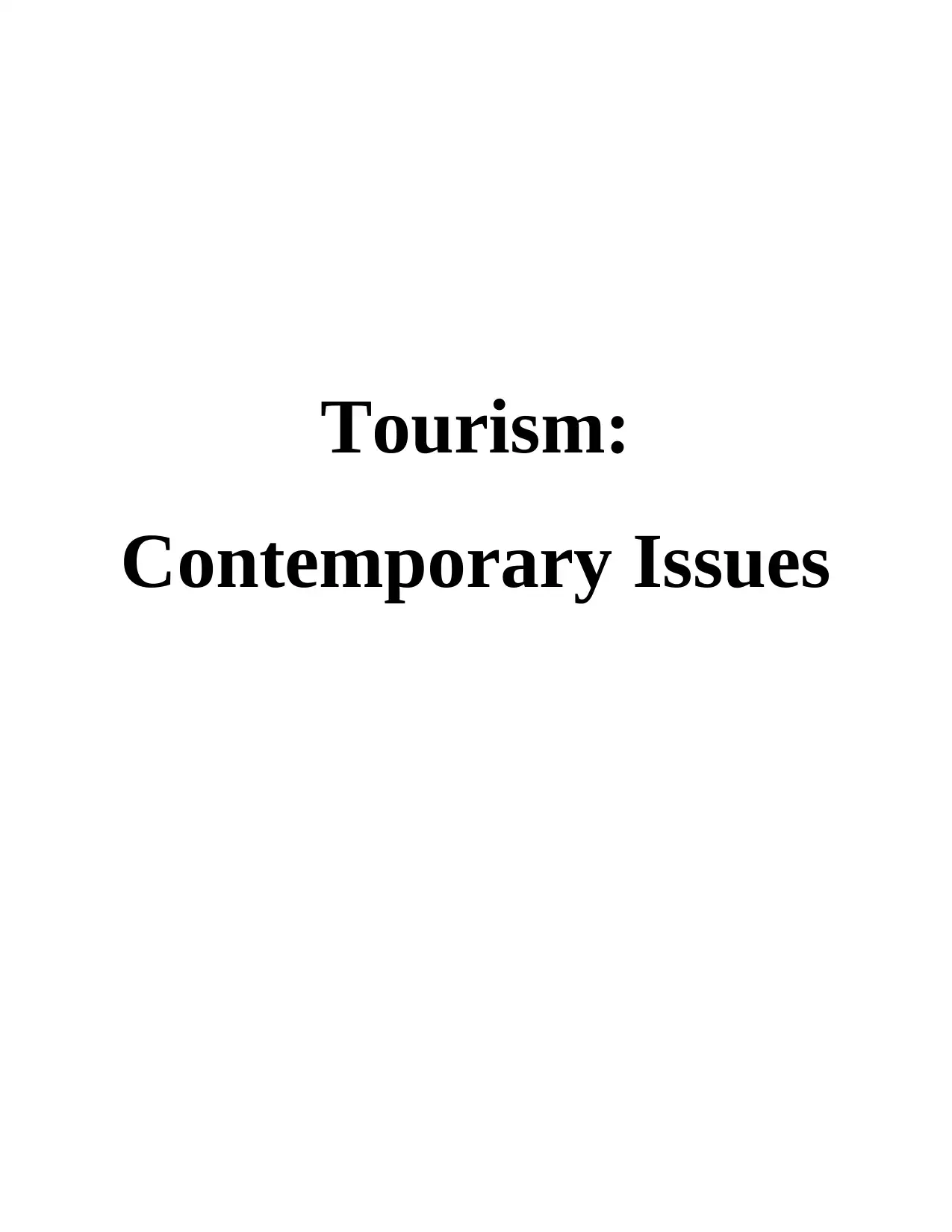
Tourism:
Contemporary Issues
Contemporary Issues
Paraphrase This Document
Need a fresh take? Get an instant paraphrase of this document with our AI Paraphraser
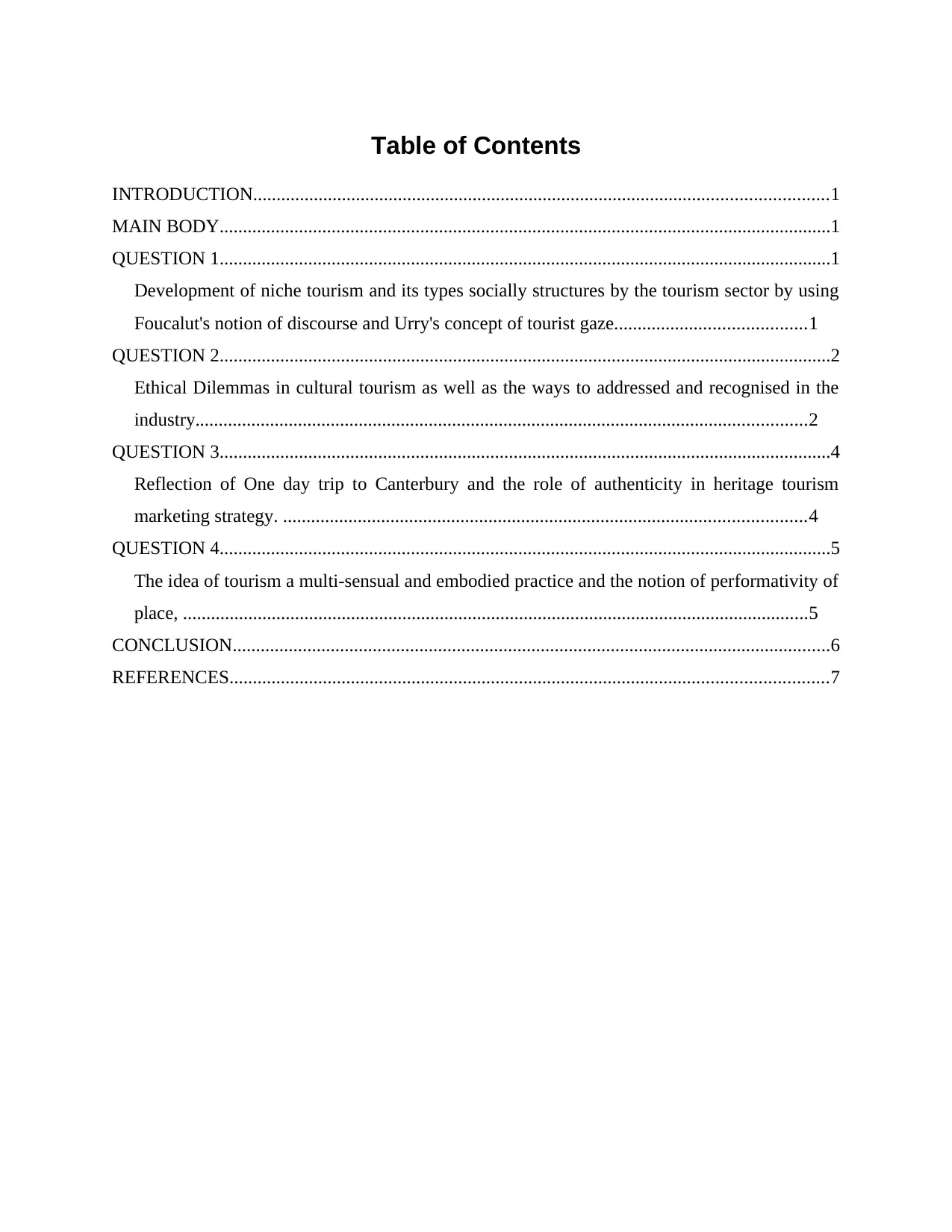
Table of Contents
INTRODUCTION...........................................................................................................................1
MAIN BODY...................................................................................................................................1
QUESTION 1...................................................................................................................................1
Development of niche tourism and its types socially structures by the tourism sector by using
Foucalut's notion of discourse and Urry's concept of tourist gaze.........................................1
QUESTION 2...................................................................................................................................2
Ethical Dilemmas in cultural tourism as well as the ways to addressed and recognised in the
industry...................................................................................................................................2
QUESTION 3...................................................................................................................................4
Reflection of One day trip to Canterbury and the role of authenticity in heritage tourism
marketing strategy. ................................................................................................................4
QUESTION 4...................................................................................................................................5
The idea of tourism a multi-sensual and embodied practice and the notion of performativity of
place, ......................................................................................................................................5
CONCLUSION................................................................................................................................6
REFERENCES................................................................................................................................7
INTRODUCTION...........................................................................................................................1
MAIN BODY...................................................................................................................................1
QUESTION 1...................................................................................................................................1
Development of niche tourism and its types socially structures by the tourism sector by using
Foucalut's notion of discourse and Urry's concept of tourist gaze.........................................1
QUESTION 2...................................................................................................................................2
Ethical Dilemmas in cultural tourism as well as the ways to addressed and recognised in the
industry...................................................................................................................................2
QUESTION 3...................................................................................................................................4
Reflection of One day trip to Canterbury and the role of authenticity in heritage tourism
marketing strategy. ................................................................................................................4
QUESTION 4...................................................................................................................................5
The idea of tourism a multi-sensual and embodied practice and the notion of performativity of
place, ......................................................................................................................................5
CONCLUSION................................................................................................................................6
REFERENCES................................................................................................................................7
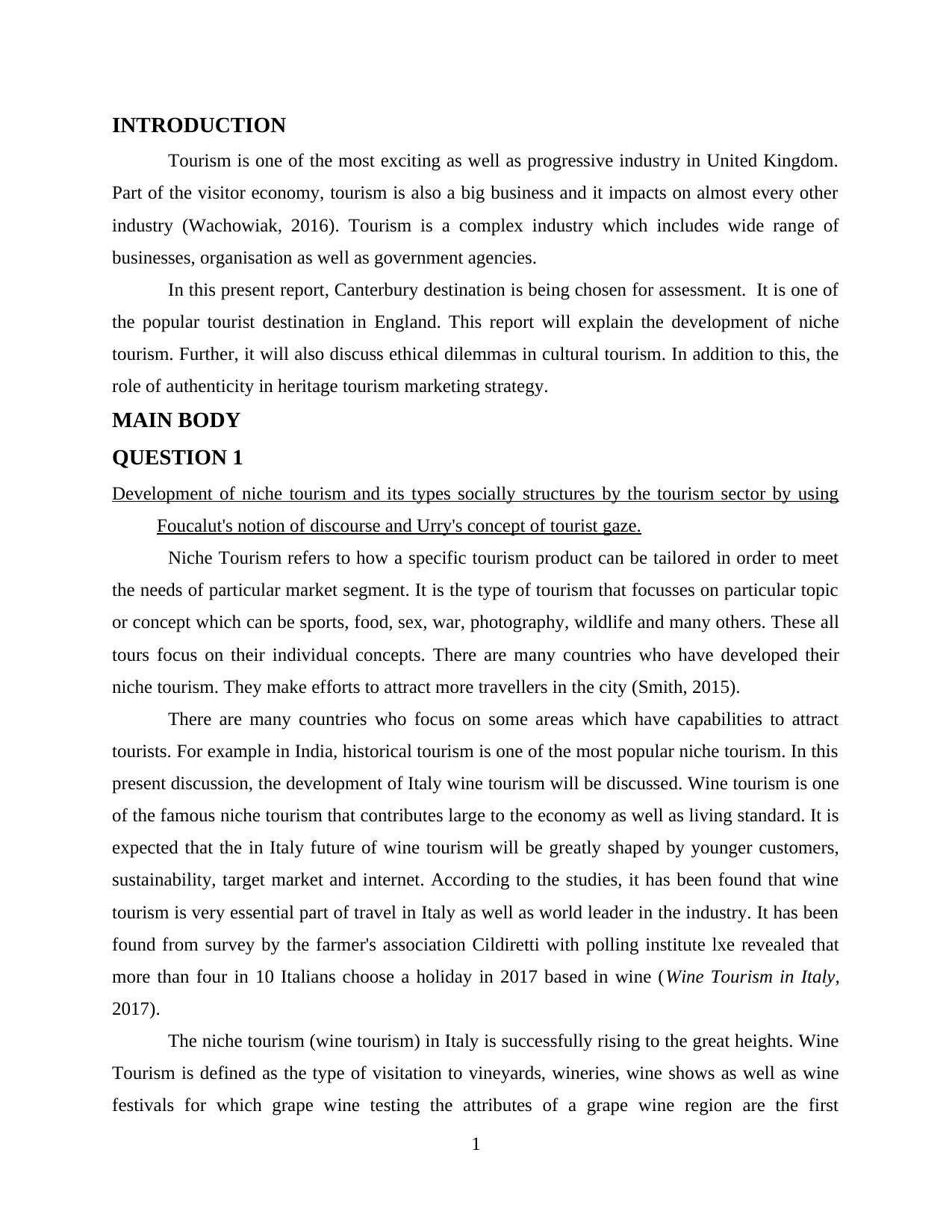
INTRODUCTION
Tourism is one of the most exciting as well as progressive industry in United Kingdom.
Part of the visitor economy, tourism is also a big business and it impacts on almost every other
industry (Wachowiak, 2016). Tourism is a complex industry which includes wide range of
businesses, organisation as well as government agencies.
In this present report, Canterbury destination is being chosen for assessment. It is one of
the popular tourist destination in England. This report will explain the development of niche
tourism. Further, it will also discuss ethical dilemmas in cultural tourism. In addition to this, the
role of authenticity in heritage tourism marketing strategy.
MAIN BODY
QUESTION 1
Development of niche tourism and its types socially structures by the tourism sector by using
Foucalut's notion of discourse and Urry's concept of tourist gaze.
Niche Tourism refers to how a specific tourism product can be tailored in order to meet
the needs of particular market segment. It is the type of tourism that focusses on particular topic
or concept which can be sports, food, sex, war, photography, wildlife and many others. These all
tours focus on their individual concepts. There are many countries who have developed their
niche tourism. They make efforts to attract more travellers in the city (Smith, 2015).
There are many countries who focus on some areas which have capabilities to attract
tourists. For example in India, historical tourism is one of the most popular niche tourism. In this
present discussion, the development of Italy wine tourism will be discussed. Wine tourism is one
of the famous niche tourism that contributes large to the economy as well as living standard. It is
expected that the in Italy future of wine tourism will be greatly shaped by younger customers,
sustainability, target market and internet. According to the studies, it has been found that wine
tourism is very essential part of travel in Italy as well as world leader in the industry. It has been
found from survey by the farmer's association Cildiretti with polling institute lxe revealed that
more than four in 10 Italians choose a holiday in 2017 based in wine (Wine Tourism in Italy,
2017).
The niche tourism (wine tourism) in Italy is successfully rising to the great heights. Wine
Tourism is defined as the type of visitation to vineyards, wineries, wine shows as well as wine
festivals for which grape wine testing the attributes of a grape wine region are the first
1
Tourism is one of the most exciting as well as progressive industry in United Kingdom.
Part of the visitor economy, tourism is also a big business and it impacts on almost every other
industry (Wachowiak, 2016). Tourism is a complex industry which includes wide range of
businesses, organisation as well as government agencies.
In this present report, Canterbury destination is being chosen for assessment. It is one of
the popular tourist destination in England. This report will explain the development of niche
tourism. Further, it will also discuss ethical dilemmas in cultural tourism. In addition to this, the
role of authenticity in heritage tourism marketing strategy.
MAIN BODY
QUESTION 1
Development of niche tourism and its types socially structures by the tourism sector by using
Foucalut's notion of discourse and Urry's concept of tourist gaze.
Niche Tourism refers to how a specific tourism product can be tailored in order to meet
the needs of particular market segment. It is the type of tourism that focusses on particular topic
or concept which can be sports, food, sex, war, photography, wildlife and many others. These all
tours focus on their individual concepts. There are many countries who have developed their
niche tourism. They make efforts to attract more travellers in the city (Smith, 2015).
There are many countries who focus on some areas which have capabilities to attract
tourists. For example in India, historical tourism is one of the most popular niche tourism. In this
present discussion, the development of Italy wine tourism will be discussed. Wine tourism is one
of the famous niche tourism that contributes large to the economy as well as living standard. It is
expected that the in Italy future of wine tourism will be greatly shaped by younger customers,
sustainability, target market and internet. According to the studies, it has been found that wine
tourism is very essential part of travel in Italy as well as world leader in the industry. It has been
found from survey by the farmer's association Cildiretti with polling institute lxe revealed that
more than four in 10 Italians choose a holiday in 2017 based in wine (Wine Tourism in Italy,
2017).
The niche tourism (wine tourism) in Italy is successfully rising to the great heights. Wine
Tourism is defined as the type of visitation to vineyards, wineries, wine shows as well as wine
festivals for which grape wine testing the attributes of a grape wine region are the first
1
⊘ This is a preview!⊘
Do you want full access?
Subscribe today to unlock all pages.

Trusted by 1+ million students worldwide
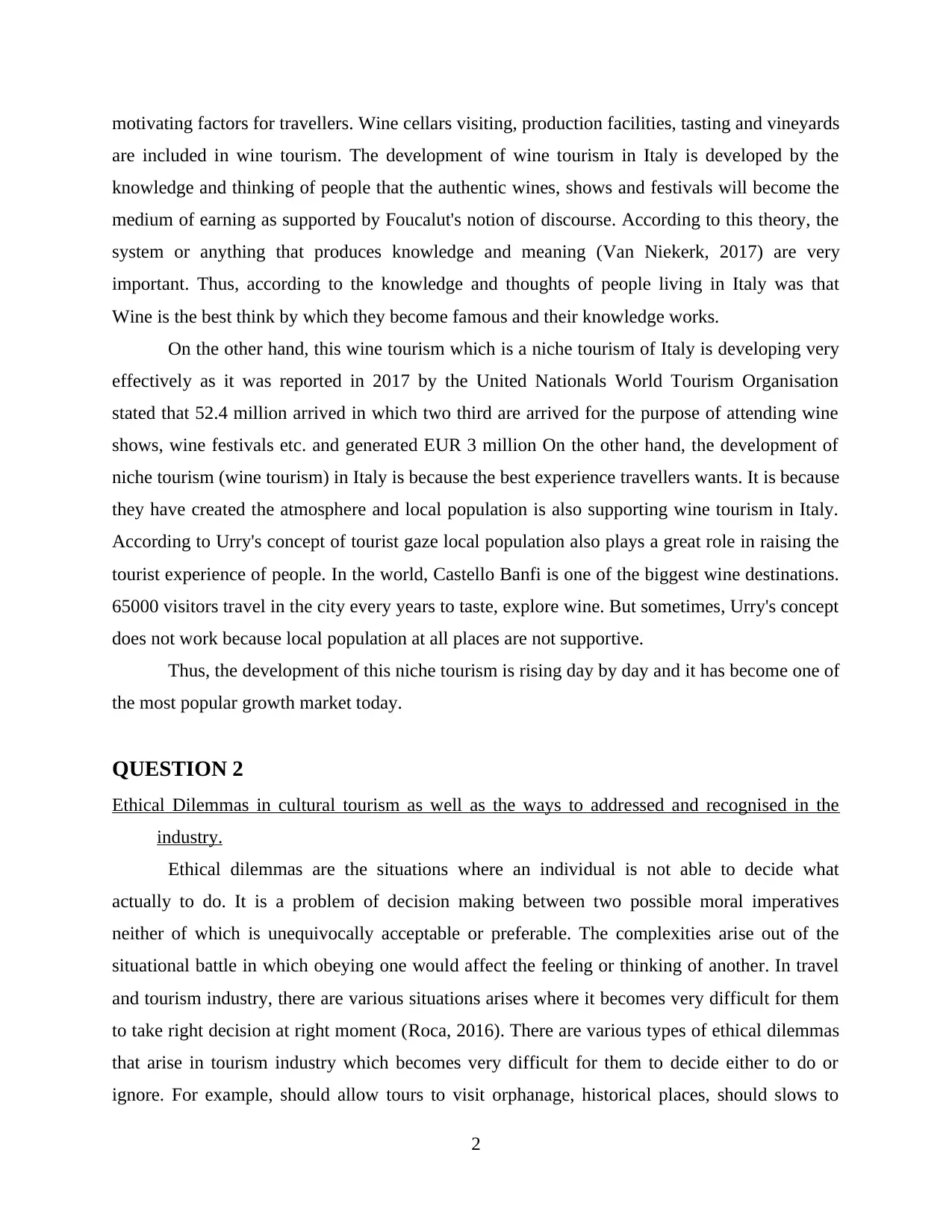
motivating factors for travellers. Wine cellars visiting, production facilities, tasting and vineyards
are included in wine tourism. The development of wine tourism in Italy is developed by the
knowledge and thinking of people that the authentic wines, shows and festivals will become the
medium of earning as supported by Foucalut's notion of discourse. According to this theory, the
system or anything that produces knowledge and meaning (Van Niekerk, 2017) are very
important. Thus, according to the knowledge and thoughts of people living in Italy was that
Wine is the best think by which they become famous and their knowledge works.
On the other hand, this wine tourism which is a niche tourism of Italy is developing very
effectively as it was reported in 2017 by the United Nationals World Tourism Organisation
stated that 52.4 million arrived in which two third are arrived for the purpose of attending wine
shows, wine festivals etc. and generated EUR 3 million On the other hand, the development of
niche tourism (wine tourism) in Italy is because the best experience travellers wants. It is because
they have created the atmosphere and local population is also supporting wine tourism in Italy.
According to Urry's concept of tourist gaze local population also plays a great role in raising the
tourist experience of people. In the world, Castello Banfi is one of the biggest wine destinations.
65000 visitors travel in the city every years to taste, explore wine. But sometimes, Urry's concept
does not work because local population at all places are not supportive.
Thus, the development of this niche tourism is rising day by day and it has become one of
the most popular growth market today.
QUESTION 2
Ethical Dilemmas in cultural tourism as well as the ways to addressed and recognised in the
industry.
Ethical dilemmas are the situations where an individual is not able to decide what
actually to do. It is a problem of decision making between two possible moral imperatives
neither of which is unequivocally acceptable or preferable. The complexities arise out of the
situational battle in which obeying one would affect the feeling or thinking of another. In travel
and tourism industry, there are various situations arises where it becomes very difficult for them
to take right decision at right moment (Roca, 2016). There are various types of ethical dilemmas
that arise in tourism industry which becomes very difficult for them to decide either to do or
ignore. For example, should allow tours to visit orphanage, historical places, should slows to
2
are included in wine tourism. The development of wine tourism in Italy is developed by the
knowledge and thinking of people that the authentic wines, shows and festivals will become the
medium of earning as supported by Foucalut's notion of discourse. According to this theory, the
system or anything that produces knowledge and meaning (Van Niekerk, 2017) are very
important. Thus, according to the knowledge and thoughts of people living in Italy was that
Wine is the best think by which they become famous and their knowledge works.
On the other hand, this wine tourism which is a niche tourism of Italy is developing very
effectively as it was reported in 2017 by the United Nationals World Tourism Organisation
stated that 52.4 million arrived in which two third are arrived for the purpose of attending wine
shows, wine festivals etc. and generated EUR 3 million On the other hand, the development of
niche tourism (wine tourism) in Italy is because the best experience travellers wants. It is because
they have created the atmosphere and local population is also supporting wine tourism in Italy.
According to Urry's concept of tourist gaze local population also plays a great role in raising the
tourist experience of people. In the world, Castello Banfi is one of the biggest wine destinations.
65000 visitors travel in the city every years to taste, explore wine. But sometimes, Urry's concept
does not work because local population at all places are not supportive.
Thus, the development of this niche tourism is rising day by day and it has become one of
the most popular growth market today.
QUESTION 2
Ethical Dilemmas in cultural tourism as well as the ways to addressed and recognised in the
industry.
Ethical dilemmas are the situations where an individual is not able to decide what
actually to do. It is a problem of decision making between two possible moral imperatives
neither of which is unequivocally acceptable or preferable. The complexities arise out of the
situational battle in which obeying one would affect the feeling or thinking of another. In travel
and tourism industry, there are various situations arises where it becomes very difficult for them
to take right decision at right moment (Roca, 2016). There are various types of ethical dilemmas
that arise in tourism industry which becomes very difficult for them to decide either to do or
ignore. For example, should allow tours to visit orphanage, historical places, should slows to
2
Paraphrase This Document
Need a fresh take? Get an instant paraphrase of this document with our AI Paraphraser
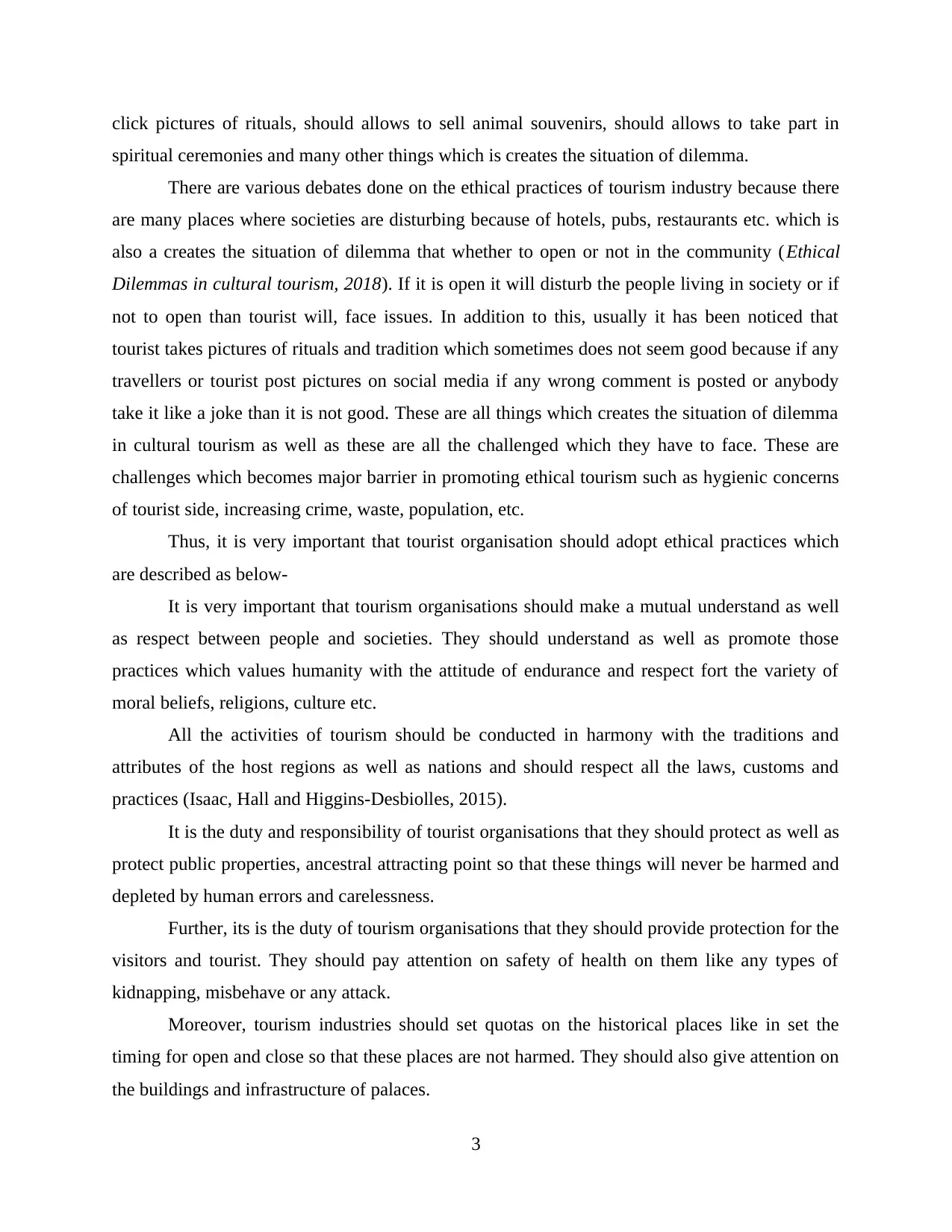
click pictures of rituals, should allows to sell animal souvenirs, should allows to take part in
spiritual ceremonies and many other things which is creates the situation of dilemma.
There are various debates done on the ethical practices of tourism industry because there
are many places where societies are disturbing because of hotels, pubs, restaurants etc. which is
also a creates the situation of dilemma that whether to open or not in the community (Ethical
Dilemmas in cultural tourism, 2018). If it is open it will disturb the people living in society or if
not to open than tourist will, face issues. In addition to this, usually it has been noticed that
tourist takes pictures of rituals and tradition which sometimes does not seem good because if any
travellers or tourist post pictures on social media if any wrong comment is posted or anybody
take it like a joke than it is not good. These are all things which creates the situation of dilemma
in cultural tourism as well as these are all the challenged which they have to face. These are
challenges which becomes major barrier in promoting ethical tourism such as hygienic concerns
of tourist side, increasing crime, waste, population, etc.
Thus, it is very important that tourist organisation should adopt ethical practices which
are described as below-
It is very important that tourism organisations should make a mutual understand as well
as respect between people and societies. They should understand as well as promote those
practices which values humanity with the attitude of endurance and respect fort the variety of
moral beliefs, religions, culture etc.
All the activities of tourism should be conducted in harmony with the traditions and
attributes of the host regions as well as nations and should respect all the laws, customs and
practices (Isaac, Hall and Higgins-Desbiolles, 2015).
It is the duty and responsibility of tourist organisations that they should protect as well as
protect public properties, ancestral attracting point so that these things will never be harmed and
depleted by human errors and carelessness.
Further, its is the duty of tourism organisations that they should provide protection for the
visitors and tourist. They should pay attention on safety of health on them like any types of
kidnapping, misbehave or any attack.
Moreover, tourism industries should set quotas on the historical places like in set the
timing for open and close so that these places are not harmed. They should also give attention on
the buildings and infrastructure of palaces.
3
spiritual ceremonies and many other things which is creates the situation of dilemma.
There are various debates done on the ethical practices of tourism industry because there
are many places where societies are disturbing because of hotels, pubs, restaurants etc. which is
also a creates the situation of dilemma that whether to open or not in the community (Ethical
Dilemmas in cultural tourism, 2018). If it is open it will disturb the people living in society or if
not to open than tourist will, face issues. In addition to this, usually it has been noticed that
tourist takes pictures of rituals and tradition which sometimes does not seem good because if any
travellers or tourist post pictures on social media if any wrong comment is posted or anybody
take it like a joke than it is not good. These are all things which creates the situation of dilemma
in cultural tourism as well as these are all the challenged which they have to face. These are
challenges which becomes major barrier in promoting ethical tourism such as hygienic concerns
of tourist side, increasing crime, waste, population, etc.
Thus, it is very important that tourist organisation should adopt ethical practices which
are described as below-
It is very important that tourism organisations should make a mutual understand as well
as respect between people and societies. They should understand as well as promote those
practices which values humanity with the attitude of endurance and respect fort the variety of
moral beliefs, religions, culture etc.
All the activities of tourism should be conducted in harmony with the traditions and
attributes of the host regions as well as nations and should respect all the laws, customs and
practices (Isaac, Hall and Higgins-Desbiolles, 2015).
It is the duty and responsibility of tourist organisations that they should protect as well as
protect public properties, ancestral attracting point so that these things will never be harmed and
depleted by human errors and carelessness.
Further, its is the duty of tourism organisations that they should provide protection for the
visitors and tourist. They should pay attention on safety of health on them like any types of
kidnapping, misbehave or any attack.
Moreover, tourism industries should set quotas on the historical places like in set the
timing for open and close so that these places are not harmed. They should also give attention on
the buildings and infrastructure of palaces.
3
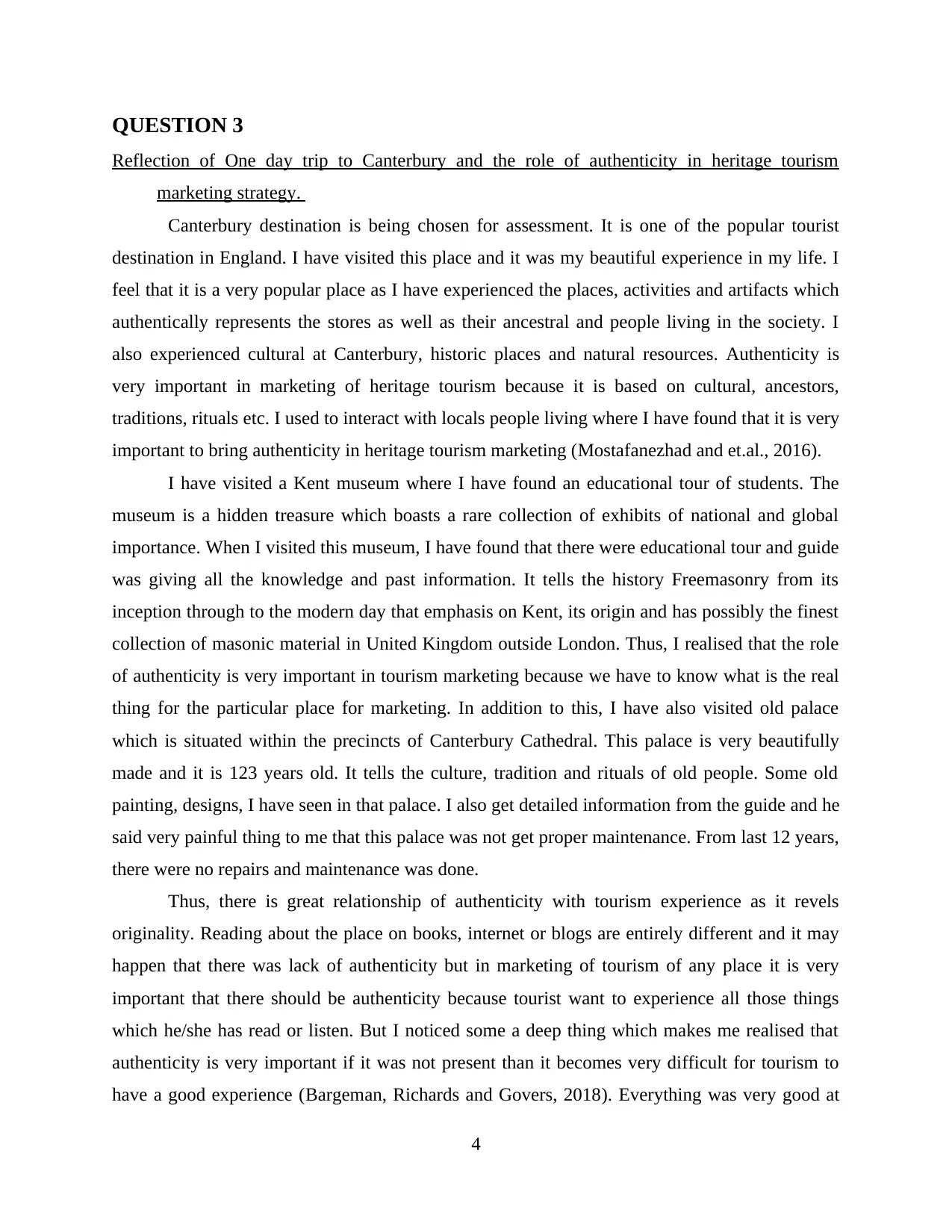
QUESTION 3
Reflection of One day trip to Canterbury and the role of authenticity in heritage tourism
marketing strategy.
Canterbury destination is being chosen for assessment. It is one of the popular tourist
destination in England. I have visited this place and it was my beautiful experience in my life. I
feel that it is a very popular place as I have experienced the places, activities and artifacts which
authentically represents the stores as well as their ancestral and people living in the society. I
also experienced cultural at Canterbury, historic places and natural resources. Authenticity is
very important in marketing of heritage tourism because it is based on cultural, ancestors,
traditions, rituals etc. I used to interact with locals people living where I have found that it is very
important to bring authenticity in heritage tourism marketing (Mostafanezhad and et.al., 2016).
I have visited a Kent museum where I have found an educational tour of students. The
museum is a hidden treasure which boasts a rare collection of exhibits of national and global
importance. When I visited this museum, I have found that there were educational tour and guide
was giving all the knowledge and past information. It tells the history Freemasonry from its
inception through to the modern day that emphasis on Kent, its origin and has possibly the finest
collection of masonic material in United Kingdom outside London. Thus, I realised that the role
of authenticity is very important in tourism marketing because we have to know what is the real
thing for the particular place for marketing. In addition to this, I have also visited old palace
which is situated within the precincts of Canterbury Cathedral. This palace is very beautifully
made and it is 123 years old. It tells the culture, tradition and rituals of old people. Some old
painting, designs, I have seen in that palace. I also get detailed information from the guide and he
said very painful thing to me that this palace was not get proper maintenance. From last 12 years,
there were no repairs and maintenance was done.
Thus, there is great relationship of authenticity with tourism experience as it revels
originality. Reading about the place on books, internet or blogs are entirely different and it may
happen that there was lack of authenticity but in marketing of tourism of any place it is very
important that there should be authenticity because tourist want to experience all those things
which he/she has read or listen. But I noticed some a deep thing which makes me realised that
authenticity is very important if it was not present than it becomes very difficult for tourism to
have a good experience (Bargeman, Richards and Govers, 2018). Everything was very good at
4
Reflection of One day trip to Canterbury and the role of authenticity in heritage tourism
marketing strategy.
Canterbury destination is being chosen for assessment. It is one of the popular tourist
destination in England. I have visited this place and it was my beautiful experience in my life. I
feel that it is a very popular place as I have experienced the places, activities and artifacts which
authentically represents the stores as well as their ancestral and people living in the society. I
also experienced cultural at Canterbury, historic places and natural resources. Authenticity is
very important in marketing of heritage tourism because it is based on cultural, ancestors,
traditions, rituals etc. I used to interact with locals people living where I have found that it is very
important to bring authenticity in heritage tourism marketing (Mostafanezhad and et.al., 2016).
I have visited a Kent museum where I have found an educational tour of students. The
museum is a hidden treasure which boasts a rare collection of exhibits of national and global
importance. When I visited this museum, I have found that there were educational tour and guide
was giving all the knowledge and past information. It tells the history Freemasonry from its
inception through to the modern day that emphasis on Kent, its origin and has possibly the finest
collection of masonic material in United Kingdom outside London. Thus, I realised that the role
of authenticity is very important in tourism marketing because we have to know what is the real
thing for the particular place for marketing. In addition to this, I have also visited old palace
which is situated within the precincts of Canterbury Cathedral. This palace is very beautifully
made and it is 123 years old. It tells the culture, tradition and rituals of old people. Some old
painting, designs, I have seen in that palace. I also get detailed information from the guide and he
said very painful thing to me that this palace was not get proper maintenance. From last 12 years,
there were no repairs and maintenance was done.
Thus, there is great relationship of authenticity with tourism experience as it revels
originality. Reading about the place on books, internet or blogs are entirely different and it may
happen that there was lack of authenticity but in marketing of tourism of any place it is very
important that there should be authenticity because tourist want to experience all those things
which he/she has read or listen. But I noticed some a deep thing which makes me realised that
authenticity is very important if it was not present than it becomes very difficult for tourism to
have a good experience (Bargeman, Richards and Govers, 2018). Everything was very good at
4
⊘ This is a preview!⊘
Do you want full access?
Subscribe today to unlock all pages.

Trusted by 1+ million students worldwide
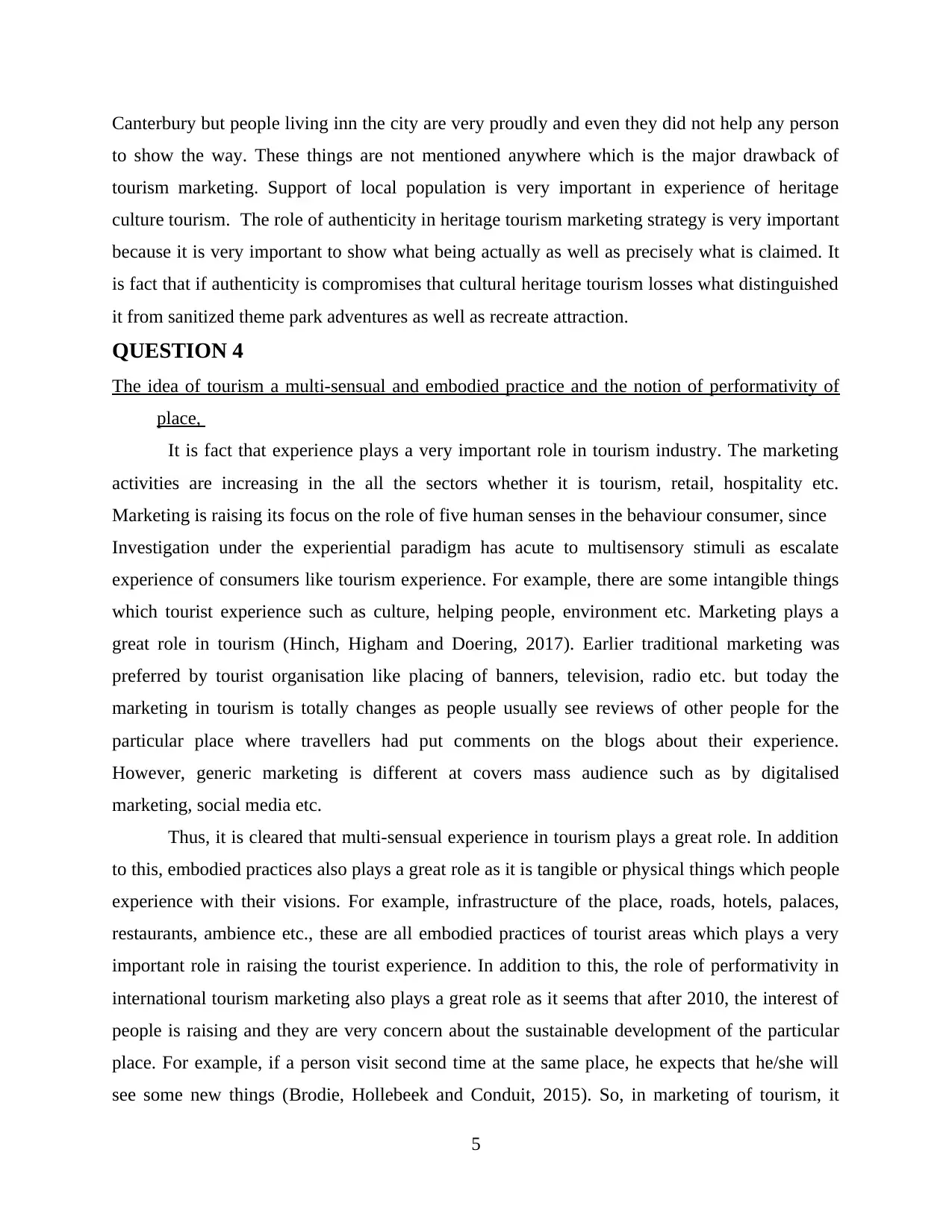
Canterbury but people living inn the city are very proudly and even they did not help any person
to show the way. These things are not mentioned anywhere which is the major drawback of
tourism marketing. Support of local population is very important in experience of heritage
culture tourism. The role of authenticity in heritage tourism marketing strategy is very important
because it is very important to show what being actually as well as precisely what is claimed. It
is fact that if authenticity is compromises that cultural heritage tourism losses what distinguished
it from sanitized theme park adventures as well as recreate attraction.
QUESTION 4
The idea of tourism a multi-sensual and embodied practice and the notion of performativity of
place,
It is fact that experience plays a very important role in tourism industry. The marketing
activities are increasing in the all the sectors whether it is tourism, retail, hospitality etc.
Marketing is raising its focus on the role of five human senses in the behaviour consumer, since
Investigation under the experiential paradigm has acute to multisensory stimuli as escalate
experience of consumers like tourism experience. For example, there are some intangible things
which tourist experience such as culture, helping people, environment etc. Marketing plays a
great role in tourism (Hinch, Higham and Doering, 2017). Earlier traditional marketing was
preferred by tourist organisation like placing of banners, television, radio etc. but today the
marketing in tourism is totally changes as people usually see reviews of other people for the
particular place where travellers had put comments on the blogs about their experience.
However, generic marketing is different at covers mass audience such as by digitalised
marketing, social media etc.
Thus, it is cleared that multi-sensual experience in tourism plays a great role. In addition
to this, embodied practices also plays a great role as it is tangible or physical things which people
experience with their visions. For example, infrastructure of the place, roads, hotels, palaces,
restaurants, ambience etc., these are all embodied practices of tourist areas which plays a very
important role in raising the tourist experience. In addition to this, the role of performativity in
international tourism marketing also plays a great role as it seems that after 2010, the interest of
people is raising and they are very concern about the sustainable development of the particular
place. For example, if a person visit second time at the same place, he expects that he/she will
see some new things (Brodie, Hollebeek and Conduit, 2015). So, in marketing of tourism, it
5
to show the way. These things are not mentioned anywhere which is the major drawback of
tourism marketing. Support of local population is very important in experience of heritage
culture tourism. The role of authenticity in heritage tourism marketing strategy is very important
because it is very important to show what being actually as well as precisely what is claimed. It
is fact that if authenticity is compromises that cultural heritage tourism losses what distinguished
it from sanitized theme park adventures as well as recreate attraction.
QUESTION 4
The idea of tourism a multi-sensual and embodied practice and the notion of performativity of
place,
It is fact that experience plays a very important role in tourism industry. The marketing
activities are increasing in the all the sectors whether it is tourism, retail, hospitality etc.
Marketing is raising its focus on the role of five human senses in the behaviour consumer, since
Investigation under the experiential paradigm has acute to multisensory stimuli as escalate
experience of consumers like tourism experience. For example, there are some intangible things
which tourist experience such as culture, helping people, environment etc. Marketing plays a
great role in tourism (Hinch, Higham and Doering, 2017). Earlier traditional marketing was
preferred by tourist organisation like placing of banners, television, radio etc. but today the
marketing in tourism is totally changes as people usually see reviews of other people for the
particular place where travellers had put comments on the blogs about their experience.
However, generic marketing is different at covers mass audience such as by digitalised
marketing, social media etc.
Thus, it is cleared that multi-sensual experience in tourism plays a great role. In addition
to this, embodied practices also plays a great role as it is tangible or physical things which people
experience with their visions. For example, infrastructure of the place, roads, hotels, palaces,
restaurants, ambience etc., these are all embodied practices of tourist areas which plays a very
important role in raising the tourist experience. In addition to this, the role of performativity in
international tourism marketing also plays a great role as it seems that after 2010, the interest of
people is raising and they are very concern about the sustainable development of the particular
place. For example, if a person visit second time at the same place, he expects that he/she will
see some new things (Brodie, Hollebeek and Conduit, 2015). So, in marketing of tourism, it
5
Paraphrase This Document
Need a fresh take? Get an instant paraphrase of this document with our AI Paraphraser
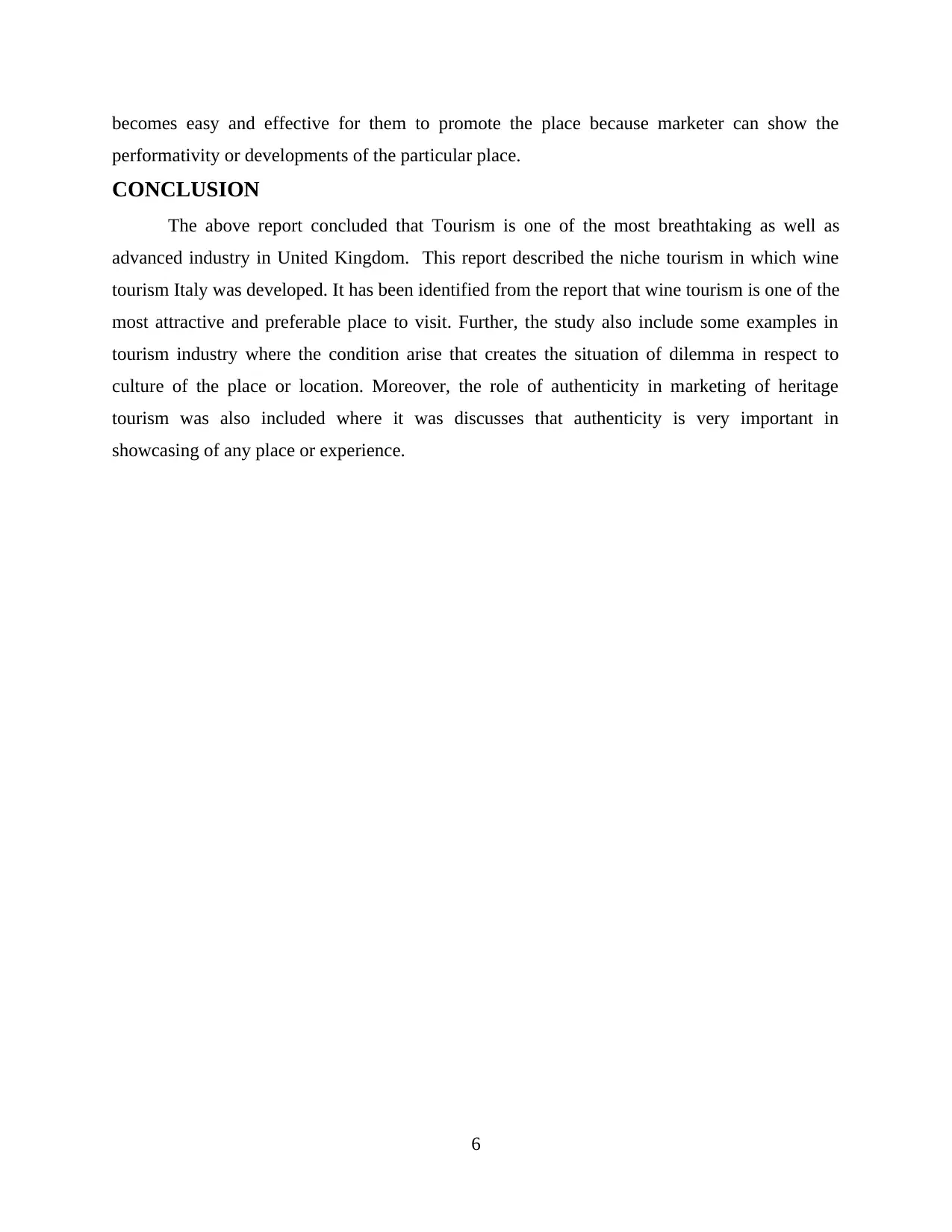
becomes easy and effective for them to promote the place because marketer can show the
performativity or developments of the particular place.
CONCLUSION
The above report concluded that Tourism is one of the most breathtaking as well as
advanced industry in United Kingdom. This report described the niche tourism in which wine
tourism Italy was developed. It has been identified from the report that wine tourism is one of the
most attractive and preferable place to visit. Further, the study also include some examples in
tourism industry where the condition arise that creates the situation of dilemma in respect to
culture of the place or location. Moreover, the role of authenticity in marketing of heritage
tourism was also included where it was discusses that authenticity is very important in
showcasing of any place or experience.
6
performativity or developments of the particular place.
CONCLUSION
The above report concluded that Tourism is one of the most breathtaking as well as
advanced industry in United Kingdom. This report described the niche tourism in which wine
tourism Italy was developed. It has been identified from the report that wine tourism is one of the
most attractive and preferable place to visit. Further, the study also include some examples in
tourism industry where the condition arise that creates the situation of dilemma in respect to
culture of the place or location. Moreover, the role of authenticity in marketing of heritage
tourism was also included where it was discusses that authenticity is very important in
showcasing of any place or experience.
6
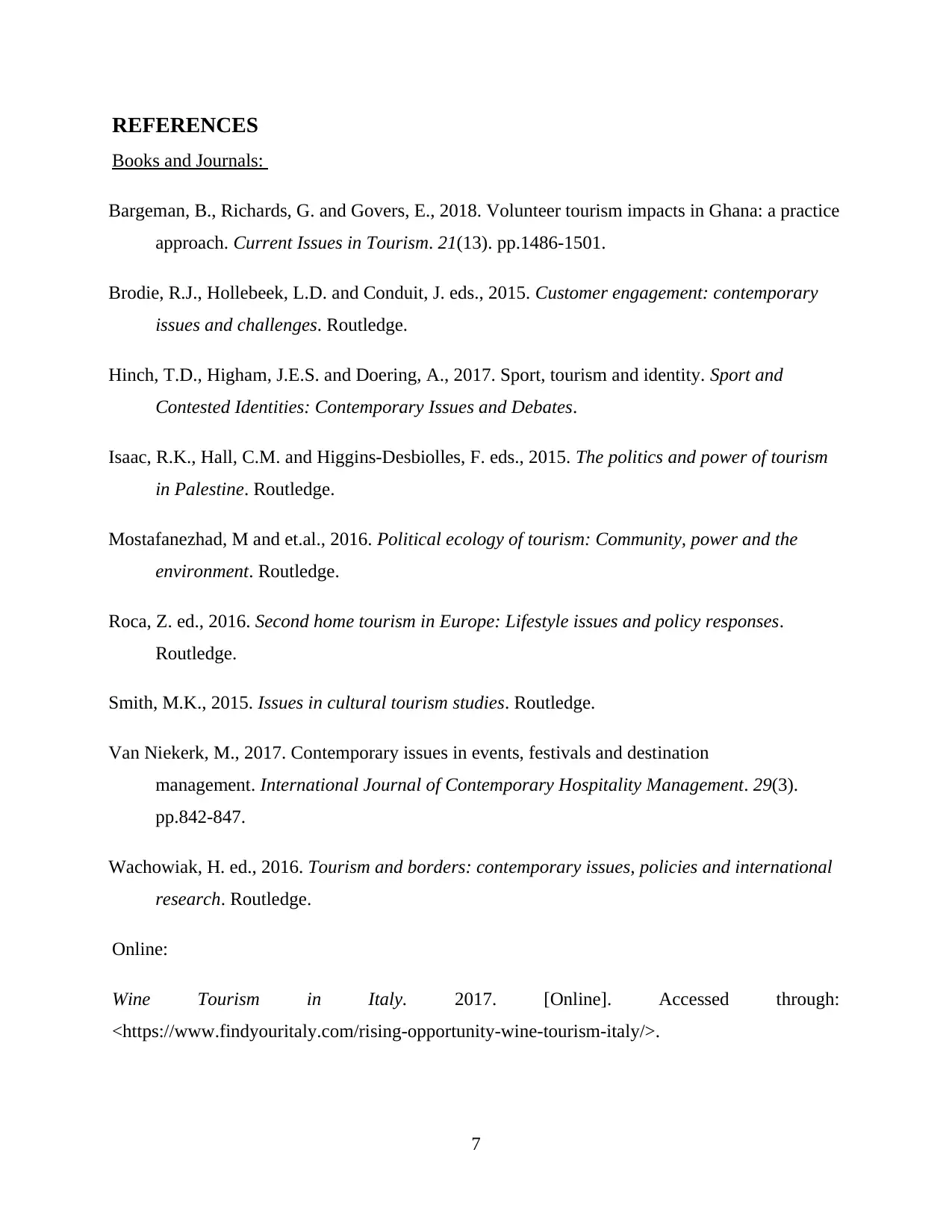
REFERENCES
Books and Journals:
Bargeman, B., Richards, G. and Govers, E., 2018. Volunteer tourism impacts in Ghana: a practice
approach. Current Issues in Tourism. 21(13). pp.1486-1501.
Brodie, R.J., Hollebeek, L.D. and Conduit, J. eds., 2015. Customer engagement: contemporary
issues and challenges. Routledge.
Hinch, T.D., Higham, J.E.S. and Doering, A., 2017. Sport, tourism and identity. Sport and
Contested Identities: Contemporary Issues and Debates.
Isaac, R.K., Hall, C.M. and Higgins-Desbiolles, F. eds., 2015. The politics and power of tourism
in Palestine. Routledge.
Mostafanezhad, M and et.al., 2016. Political ecology of tourism: Community, power and the
environment. Routledge.
Roca, Z. ed., 2016. Second home tourism in Europe: Lifestyle issues and policy responses.
Routledge.
Smith, M.K., 2015. Issues in cultural tourism studies. Routledge.
Van Niekerk, M., 2017. Contemporary issues in events, festivals and destination
management. International Journal of Contemporary Hospitality Management. 29(3).
pp.842-847.
Wachowiak, H. ed., 2016. Tourism and borders: contemporary issues, policies and international
research. Routledge.
Online:
Wine Tourism in Italy. 2017. [Online]. Accessed through:
<https://www.findyouritaly.com/rising-opportunity-wine-tourism-italy/>.
7
Books and Journals:
Bargeman, B., Richards, G. and Govers, E., 2018. Volunteer tourism impacts in Ghana: a practice
approach. Current Issues in Tourism. 21(13). pp.1486-1501.
Brodie, R.J., Hollebeek, L.D. and Conduit, J. eds., 2015. Customer engagement: contemporary
issues and challenges. Routledge.
Hinch, T.D., Higham, J.E.S. and Doering, A., 2017. Sport, tourism and identity. Sport and
Contested Identities: Contemporary Issues and Debates.
Isaac, R.K., Hall, C.M. and Higgins-Desbiolles, F. eds., 2015. The politics and power of tourism
in Palestine. Routledge.
Mostafanezhad, M and et.al., 2016. Political ecology of tourism: Community, power and the
environment. Routledge.
Roca, Z. ed., 2016. Second home tourism in Europe: Lifestyle issues and policy responses.
Routledge.
Smith, M.K., 2015. Issues in cultural tourism studies. Routledge.
Van Niekerk, M., 2017. Contemporary issues in events, festivals and destination
management. International Journal of Contemporary Hospitality Management. 29(3).
pp.842-847.
Wachowiak, H. ed., 2016. Tourism and borders: contemporary issues, policies and international
research. Routledge.
Online:
Wine Tourism in Italy. 2017. [Online]. Accessed through:
<https://www.findyouritaly.com/rising-opportunity-wine-tourism-italy/>.
7
⊘ This is a preview!⊘
Do you want full access?
Subscribe today to unlock all pages.

Trusted by 1+ million students worldwide

Ethical Dilemmas in cultural tourism. 2018. [Online]. Accessed through:
<https://www.tourismconcern.org.uk/ethical-travel-dilemmas/>.
8
<https://www.tourismconcern.org.uk/ethical-travel-dilemmas/>.
8
1 out of 10
Related Documents
Your All-in-One AI-Powered Toolkit for Academic Success.
+13062052269
info@desklib.com
Available 24*7 on WhatsApp / Email
![[object Object]](/_next/static/media/star-bottom.7253800d.svg)
Unlock your academic potential
Copyright © 2020–2025 A2Z Services. All Rights Reserved. Developed and managed by ZUCOL.




